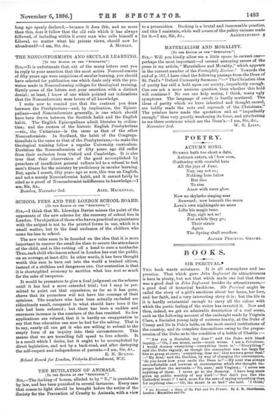THE NONCONFORMISTS AND SECULAR LEARNING. [To THE EDITOR or TER
" SPECTATOR.'] SIR,—It is unfortunate that, out of the many letters sent you in reply to your assertion that the most active Nonconformists of fifty years ago were suspicions of secular learning, you should have selected for publication one which duals only with the pro- vision made in Nonconforming colleges for theological training. Surely some of the letters met your assertion with a distinct denial ; at least, I know of one which pointed out indications that the Nonconformists were lovers of all knowledge.
I write now to remind you that the contrast you draw between the Presbyterians—and, by implication, the Episco- palians—and Nonconformists generally, is one which should have been drawn between the Scottish habit and the English habit. The English Episcopalians admit literates to ordina- tion; and the custom of the historic English Presbyterians' —viz., the Unitarians—is the same as that of the other Nonconformists. In Scotland, the habit of the Congrega- tionalists is the same as that of the Presbyterians,—to make the -theological training follow a regular University curriculum. Doubtless the Nonconformists of fifty years ago did suffer
• from their exclusion from Oxford and Cambridge. It is also tree that their observation of the good accomplished by preachers of insufficient general culture led to a refusal to test men's fitness for the ministry by proficiency in secular learning. But, again I assert, fifty years ago as now, this was an English, And not a merely Nonconformist habit, and it cannot fairly be cited as a proof of Nonconformist indifference to knowledge.—I .am, Sir, Jo.,














































 Previous page
Previous page